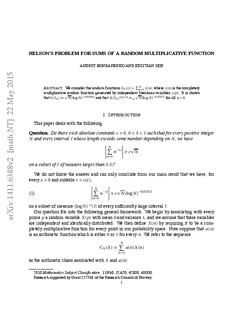| dc.contributor.author | Seip, Kristian | |
| dc.contributor.author | Bondarenko, Andriy | |
| dc.date.accessioned | 2015-12-04T08:01:06Z | |
| dc.date.accessioned | 2016-06-15T11:32:06Z | |
| dc.date.available | 2015-12-04T08:01:06Z | |
| dc.date.available | 2016-06-15T11:32:06Z | |
| dc.date.issued | 2016-10-21 | |
| dc.identifier.citation | Mathematika 2016, 62:101-110 | nb_NO |
| dc.identifier.issn | 0025-5793 | |
| dc.identifier.uri | http://hdl.handle.net/11250/2392701 | |
| dc.description.abstract | We consider the random functions $S_{N}(z):=\sum _{n=1}^{N}z(n)$SN(z):=∑Nn=1z(n), where $z(n)$z(n) is the completely multiplicative random function generated by independent Steinhaus variables $z(p)$z(p). It is shown that $\mathbb{E}|S_{N}|\gg \sqrt{N}(\log N)^{-0.05616}$E|SN|≫N−−√(logN)−0.05616 and that $(\mathbb{E}|S_{N}|^{q})^{1/q}\gg _{q}\sqrt{N}(\log N)^{-0.07672}$(E|SN|q)1/q≫qN−−√(logN)−0.07672 for all $q>0$q>0 | nb_NO |
| dc.language.iso | eng | nb_NO |
| dc.publisher | University College London, Faculty of Mathematical and Physical Sciences, Department of Mathematics | nb_NO |
| dc.title | Helson's problem for sums of a random multiplicative function | nb_NO |
| dc.type | Journal article | nb_NO |
| dc.type | Peer reviewed | nb_NO |
| dc.date.updated | 2015-12-04T08:01:05Z | |
| dc.source.pagenumber | 101-110 | nb_NO |
| dc.source.volume | 62 | nb_NO |
| dc.source.journal | Mathematika | nb_NO |
| dc.identifier.doi | 10.1112/S0025579315000236 | |
| dc.identifier.cristin | 1296859 | |
| dc.relation.project | Norges forskningsråd: 227768 | nb_NO |
| dc.description.localcode | © 2015 University College London. This is the authors’ accepted and refereed manuscript to the article. | nb_NO |
